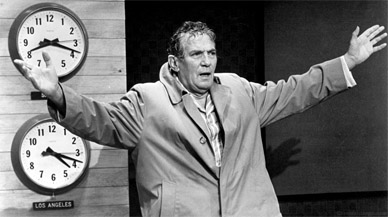Viking Night: Network
By Bruce Hall
April 16, 2013
BoxOfficeProphets.com

But Sidney Lumet’s Network would have you believe that good television is a right, not a privilege. And at no point does it hold its audience accountable for what it seems to believe is the crime of the century. Paddy Chayefsky’s Oscar winning screenplay goes through great pains to lift the veil of lies away from television’s black, twisted soul. Inside is a hyper-competitive, irreversibly depraved mechanism designed to put profit before people. Your television hates you because you’re a mindless, grinning bag of meat whose allegiance is on sale to the lowest bidder. I guess that's one way to look at it, but at no point are we asked to question our roles as consumers in such a content driven environment.
Network is set at the tail end of television's "golden age" circa 1976, when the airwaves were crowded with three whole networks – ABC, NBC, and CBS. For the sake of fiction we're asked to imagine a fourth upstart called Fox UBS, where things have not been going so well. In fact, if Walter Cronkite is the most trusted man in America, Howard Beale (Peter Finch) of the UBS Evening News might be the most unfortunate. For his lifetime of distinguished service to journalism Beale has been rewarded with divorce, a bum liver, and a tarnished image from years of declining ratings. Eventually UBS has had enough, and orders news division president Max Schumacher (William Holden) to fire his most trusted colleague.
After an evening of bittersweet reminiscence, they agree to a brief transition, allowing Howard a chance to end his tenure gracefully. So the next night on live television Beale announces that because of low ratings, he’s going to commit suicide on air. He’s immediately fired, but convinces Max to pull some strings and allow him one last chance to apologize on air and retire with at least a shred of dignity. His wish granted, Howard promptly deviates from the script and starts screaming obscenities. Red faced and bug eyed, he rants about life, the universe, and everything - and Max lets him do it. In a decade where the sound of a toilet flushing on television was water cooler talk, this was kind of a big deal.
Both men are fired, but the network brass happen to notice the ratings boost Beale has suddenly provided. They decide to keep him on the air, but ask Schumacher back to keep an eye on him. There are eyes on Schumacher too. They belong to Diana Christensen (Faye Dunaway), an ambitious young executive who sees the situation as an opportunity to define the future of television. She convinces her boss - corporate bean counter Fred Hackett (Robert Duvall) - that a network might actually make money by actively catering to lowest common denominator entertainment. Everyone can see that a good man is in the midst of a mental breakdown, but only Max can see how wrong it is to exploit him. He does his best to protect Howard, even as his working relationship with Diana begins to cross into dangerous (and sexy) territory. It’s obvious this can’t end well, but the script takes a pretty hard detour at several points. How you feel about this will depend on your ability to find humor in strange places, and how much you enjoy being lectured. It’s a lot to ask of an audience, and it would be a shame to waste such a complex story on a less than capable director.
Luckily, they didn’t. Sidney Lumet pulls typically strong (and occasionally powerful) performances out of his leads. Chayefsky apparently had some disappointing experiences working in television, so his screenplay has some compelling opinions about its role in society. It also contains moments of tremendous insight and occasionally scathing wit. But as I mentioned before, the central theme this movie wants to hammer into you is that television is a soulless destroyer of the human spirit. It’s a manipulative, dehumanizing force that wants to turn you into a bad person - without your consent and sometimes even without your active participation. But the movie is so sure of itself, so smugly devoted to its own dogma that it feels like a narcissistic diatribe levied by someone with a grudge.
Regardless of where it comes from, Chayefsky’s hyper-intellectual sense of righteous indignation comes across loud and clear. The inhabitants of this world all speak in the kind of polished, excessively erudite way you usually only hear in plays, or on The West Wing. And Lumet allows everyone to shout their dialogue a little too often. I realize that in the right hands, over acting can seem more dramatic, but we all learn pretty early in life that yelling and waving your arms doesn't make your opinion any more valid. It's not that Network isn’t full of fine performances, it's that at critical times they're too self aware. This is a thoroughly left leaning exercise in entertainment-activism, and that makes the (attempted) satire feel more self serving than it should.
In reality, bad taste is all around us; not just on television. And commerce has been the most important thing on earth since someone figured out you could make more money with money than with guns. People want you to like what they have to sell, which give us the power to change the conversation. If we don't like what's on television, we don't have to watch it. If we don't like what those big, mean corporations are trying to sell us, we don't have to buy it. And if we continue to do so anyway, the fault isn't theirs, it's ours. Our nature dictates what we find entertaining and that in turn determines how far the people who entertain us are willing to go. So if you don’t like what’s on television, that’s fine - just remember to point the thumb, not the finger.